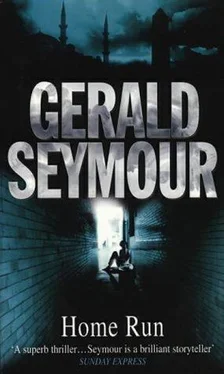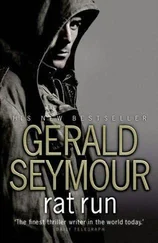Gerald Seymour - Home Run
Здесь есть возможность читать онлайн «Gerald Seymour - Home Run» весь текст электронной книги совершенно бесплатно (целиком полную версию без сокращений). В некоторых случаях можно слушать аудио, скачать через торрент в формате fb2 и присутствует краткое содержание. Жанр: Триллер, на английском языке. Описание произведения, (предисловие) а так же отзывы посетителей доступны на портале библиотеки ЛибКат.
- Название:Home Run
- Автор:
- Жанр:
- Год:неизвестен
- ISBN:нет данных
- Рейтинг книги:5 / 5. Голосов: 1
-
Избранное:Добавить в избранное
- Отзывы:
-
Ваша оценка:
- 100
- 1
- 2
- 3
- 4
- 5
Home Run: краткое содержание, описание и аннотация
Предлагаем к чтению аннотацию, описание, краткое содержание или предисловие (зависит от того, что написал сам автор книги «Home Run»). Если вы не нашли необходимую информацию о книге — напишите в комментариях, мы постараемся отыскать её.
Home Run — читать онлайн бесплатно полную книгу (весь текст) целиком
Ниже представлен текст книги, разбитый по страницам. Система сохранения места последней прочитанной страницы, позволяет с удобством читать онлайн бесплатно книгу «Home Run», без необходимости каждый раз заново искать на чём Вы остановились. Поставьте закладку, и сможете в любой момент перейти на страницу, на которой закончили чтение.
Интервал:
Закладка:
She turned. She came towards him. She put out her arms and looped them around his neck. Her mother had told her to come back, and not just to collect her suitcases, her mother had told her to try again. One last bloody time, she had told her mother, she would try again. "Are they all like you, in April?"
"Yes."
"All on 70 hours a week, seven days a week?"
"When it's hot, yes."
"Do all their wives bitch?"
" Those that have stayed, yes."
"I bought some steak, and a bottle."
She kissed him. He couldn't remember when she had last kissed him. He held on to her, and the telephone rang. He picked the telephone off the wall bracket.
"Yes, it is, hello Bill…"
He felt her arms coming away from his neck. He saw the sadness flood her face. He was listening. He saw her grab inside her bag, and slap the meat down on to the kitchen table.
"The Lane tomorrow. Eight sharp. Look forward to it…
Ann, she's great, she's in great form. Thanks, Bill, see you in the morning."
He could see that she was crying. Park did not know how to stop his wife's tears. He did not know how to tell her of his excitement because the April leader had called him for a meeting, eight o'clock in the morning, at Investigation Bureau's offices on New Fetter Lane, and promised a good one.
The teaboy's message was carried by a passenger from Bahrain to Abu Dhabi on the Gulf, and then flown on, having been passed to a member of an IranAir cabin crew, to Tehran.
The message reached the desk of a counter-subversion investigator in an office on the fourth floor of a small office block, close to Bobby Sands Street, once Churchill Street.
The block was not identified in any way, but was a part of the Ministry of Information and Intelligence. To the investigator the transcript of a briefly heard conversation was a source of amazement.
The investigator had read the message several times. He knew "Dolphin". There would have been a dozen men in the section who knew the codename of Matthew Cedric Furniss.
He had known the codename from far back, from times that were not referred to when he had worked for a different master, before the Revolution. He was astonished that the same codename was still maintained over so many years. In the Islamic Republic of Iran the British Secret Intelligence Service was hated with a loathing second only to that reserved for the Central Intelligence Agency, the Spies for the Great Satan. The investigator was not a man to initiate action, too great a survivor for that. To have survived a career with the Sazman-e Amniyat Va Attilaat-e Keshvar, the Organisation of National Security and Intelligence, to have found a safe haven in an organisation dedicated to rooting out all traces of S A V A K, that was survival indeed. His way was to assemble information and present it to those few people in the regime who had the power to act. To many, the investigator was a valued tool.
On his computer, IBM state-of-the-art, he punched up the entry on Matthew Cedric Furniss, and composed a brief note on the information that the British head of Iran Desk was travelling in the region to pass on a reassessment of intelligence aims and means.
The investigator always worked late in his office. He liked the cool and calm of the evening, the silent shadows in the corridors. He made his decision, he lifted his telephone. When he talked it was against the distant thunder of an air raid striking the west of the city.
He travelled on a false passport in his wife's maiden name, and with the occupation of "Academic".
Harriet had seen him off, which was unusual, but then it was wholly unusual for a Desk Head to journey abroad. They had had their little nuzzles at each other's cheeks, and he had told her to get back to the Bibury cottage and keep on giving that city farmer hell, double-time, over the rape of the footpath.
Actually Mattie was rather pleased to be airborne, in harness again, but he hadn't said that to Harriet. Good to be on the road, not pushing paper.
4
The car had coughed to life, and thick fumes poured from the exhaust. He let the engine run while he thanked his neighbour for the loan of the charged battery that had been attached to the leads. He could ask any small favour of his neighbour and it would be granted. His neighbour knew his work. Most m en, in fact, who knew his work, treated him with respect.
No man in his company offered him offence or cursed him.
Perhaps no man in Tabriz could feel with certainty that he would never look across the space of a cell at the deep brown eyes that would peep from the slits of the tight-fitting black mask that he had taken to wearing when he performed his work. The highest in the land, and the lowest, would all walk in the fear that they might, one day, feel the grip of his thick fingered fist upon their arm. It had not been done by himself, but he knew the man who had carried out the sentence of the Special Court of the Clergy on Mehdi Hashemi, and Hashemi had been the protege of the man named by the Imam as his successor. Likewise, he knew the man who had put Sadeq Ghotzbadeh to death, and Ghotbzadeh had been the Foreign Minister of the nation and the favourite of the Imam. No man in Tabriz trifled with the executioner. He was adept in hanging and shooting and lashing and organising the casting of stones at women taken in adultery, and in the handling of the newly arrived machine that was powered by electricity and that could slice with a guillotine knife through the fingers of a thief. He would use it this day: a thief who had stolen from a vegetable grower. And three executions, all in the city: a trafficker in narcotics, a Kurd who had aided the "hypocrites", a rapist of small children.
His wife was scrubbing shirts in the yard behind the house.
She hardly acknowledged his shouted farewell from the back door. His children, all four of them, were playing with a deflated ball around their mother's legs, too intent on their game to hear him. Inside the house, from a cupboard beside the bed in the room he shared with his wife, he took a 9mm Browning pistol – old, well cared for, accurate. He heard the car engine running sweetly beyond the open door.
He walked out into the morning. He tiptoed between the rain puddles because he had earlier shined his shoes. He climbed into his car, and laid the Browning, that was loaded but not cocked, on the seat beside him, and he covered the pistol with yesterday's Ettelaat.
As he drove away he hooted his horn. He smiled briefly, he did not think that the sound of the horn would interrupt the game of football.
He tacked up the lane, avoiding the deeper holes, going slowly so as not to damage the suspension of the old Hillman Hunter. He rolled to a halt at the junction with the main road.
There was a flow of lorry traffic heading towards the centre of the city. He waited for the gap.
He saw a young man a little down the far side of the main road, facing towards the city centre, astride his motorcycle.
The young man was stopped at the side of the road. The young man wore a blue tracksuit, and was well bearded and bare headed, and he carried a satchel bag slung around his neck.
He saw the gap open for him, a small space, and he lurched the Hillman Hunter forward, seized his opportunity. He heard the high long blast of a horn behind him, but the Hillman Hunter had little acceleration and the lorry's brakes seemed to punch the air as the huge grille closed on his rear view mirror. Another howling blast on the lorry's horn and then he was under way. It was always a difficult manoeuvre, getting out of the lane in which he lived, and joining the highway into Tabriz.
He was boxed in. There was a central reservation to his left. There was a Dodge pick-up to his right, filled with construction labourers. There was a cattle lorry to his front, there was a lorry with refrigerated cargo behind him. He could not go slower, he could not go faster. No matter that he could not pass the livestock lorry. He was not late for his work.
Читать дальшеИнтервал:
Закладка:
Похожие книги на «Home Run»
Представляем Вашему вниманию похожие книги на «Home Run» списком для выбора. Мы отобрали схожую по названию и смыслу литературу в надежде предоставить читателям больше вариантов отыскать новые, интересные, ещё непрочитанные произведения.
Обсуждение, отзывы о книге «Home Run» и просто собственные мнения читателей. Оставьте ваши комментарии, напишите, что Вы думаете о произведении, его смысле или главных героях. Укажите что конкретно понравилось, а что нет, и почему Вы так считаете.












